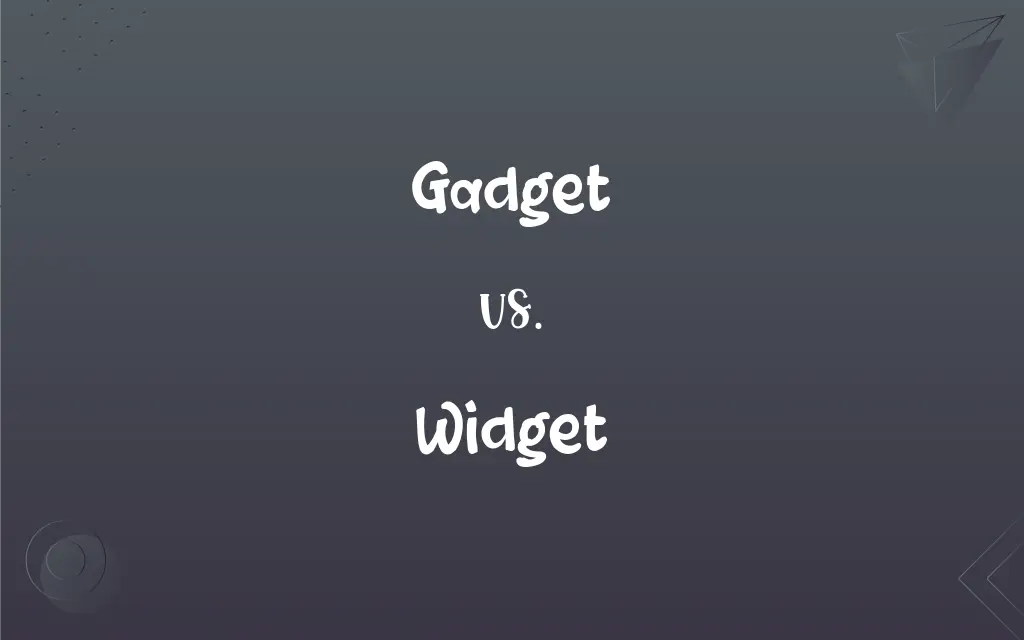Gadget vs. Widget: What's the Difference?
Edited by Aimie Carlson || By Harlon Moss || Updated on October 10, 2023
A gadget refers to a small tool or device with a particular purpose. On the other hand, a widget, in digital terms, is a software element allowing users to perform a function or access a service on a user interface.

Key Differences
A gadget is a compact device or appliance serving a particular purpose, often regarded for its ingenious design. Widgets, on the other hand, primarily pertain to the digital world, representing an element that provides specific functionality within a user interface. While gadgets might inspire thoughts of physical objects like smartwatches or pocket tools, widgets make us think of customizable weather displays or clocks on our smartphone screens.
Gadget use transcends into physical and tangible realms, often embodying technological advancements in a compact and utilitarian form. Conversely, widgets are not tangible but exist within the digital space, providing actionable or interactive functionalities on a website, desktop, or mobile platform. Gadget utility is hands-on, while widget utility is virtual and interactive through screens.
Gadget functionality usually stands alone, operating independently, or with minimal reliance on other devices or platforms. In contrast, a widget typically necessitates a platform to host its functionality, such as a website, mobile, or computer desktop. Gadgets might need no platform to perform their function, whereas widgets exist purely to enhance or facilitate functionalities within a platform.
Gadgets often represent technological advancements and are associated with modernity and convenience. Widgets, however, symbolize an evolution in user interface design and user experience, offering enhanced interactive experiences on digital platforms. The materiality of gadgets can evoke tactile engagement, while widgets offer a seamless, integrated user interface experience without any physical interaction.
The purchasing of gadgets happens through retail or online platforms and results in a physical object that one can touch and manipulate. Widgets, in contrast, might be downloadable or integrated into a digital platform, with no physical presence or tangibility. While gadgets might find a place in our pockets or on our desks, widgets reside quietly, ready to serve their purpose within our digital screens.
ADVERTISEMENT
Comparison Chart
Physical vs. Digital
Gadgets are physical objects.
Widgets are digital and virtual.
Dependency
Gadgets usually operate independently.
Widgets need a platform or application to function.
Interaction
Gadgets involve physical interaction.
Widgets involve digital or screen-based interaction.
Utility & Function
Gadgets perform tangible functions or tasks, often technological in nature.
Widgets offer specific functionalities within digital interfaces, e.g., providing information or enabling a feature.
Accessibility & Acquisition
Gadgets can be bought in stores or online and are physically owned.
Widgets are often downloadable or pre-integrated in platforms, with no physical form or ownership.
ADVERTISEMENT
Gadget and Widget Definitions
Gadget
Gadgets can represent technological advancements and modernity.
The inventor showcased a gadget that could generate energy from movement.
Widget
A widget is a small interactive digital application embedded within a webpage or mobile interface.
She checked the weather forecast on her phone using a widget.
Gadget
Gadgets can vary in form and function, extending to various aspects of daily life.
The fitness tracker gadget became popular for monitoring physical activity and health metrics.
Widget
Widgets in software are lightweight applications that run on a device’s home screen.
He downloaded a widget that provided daily motivational quotes on his smartphone’s home screen.
Gadget
A gadget is a small mechanical or electronic tool or device.
He purchased a new kitchen gadget to simplify chopping vegetables.
Widget
A widget can be an element of a graphical user interface that facilitates user interaction, such as buttons or sliders.
The designer added a volume control widget to the music app.
Gadget
Gadgets often provide convenient solutions to specific problems or tasks.
Her travel gadget, which combined a fork, spoon, and knife, was particularly handy during camping trips.
Widget
A widget may also refer to a generic unit of production in economic examples or theories.
The economics professor explained the production costs per widget in the theoretical manufacturing scenario.
Gadget
Gadgets typically feature an innovative design or function.
The smartphone became an essential gadget due to its multifunctionality.
Widget
Widgets often allow users to perform certain functions or access specific services within a larger application or platform.
He used a currency conversion widget on the financial news website to check exchange rates.
Gadget
A small specialized mechanical or electronic device; a contrivance.
Widget
A small mechanical device or control; a gadget.
Gadget
(obsolete) A thing whose name cannot be remembered; thingamajig, doohickey.
Widget
An unnamed or hypothetical manufactured article.
Widget
An element of a GUI, such as a text box or button, that displays information or settings that can be entered or altered by the user.
FAQs
Can a widget exist independently?
Typically, no; widgets usually function within a platform or larger application.
Are gadgets always electronic?
No, gadgets can be mechanical, electronic, or a combination thereof.
How do gadgets and widgets differ in usage?
Gadgets are typically used directly and physically, while widgets are used interactively within a digital interface.
What is a widget in digital terms?
A widget is an element in the user interface that enables user interaction or provides information.
Can gadgets be virtual?
Generally, gadgets are physical, but some modern colloquial uses might describe virtual tools as gadgets.
Do all gadgets require energy or power to function?
No, some gadgets (like a multifunctional tool) work mechanically without power.
Is a gadget tangible?
Yes, gadgets are usually physical objects that can be handled and manipulated.
What is a notable feature of a gadget?
Gadgets often stand out due to their innovative design or functionality.
Can widgets be installed?
Yes, some widgets can be installed or added to a digital platform or application.
How are widgets related to user interface design?
Widgets are components that enhance user interaction and functionality within a user interface.
Can widgets operate offline?
Some can function offline, while others might require an internet connection for full functionality.
What is a gadget?
A gadget is a small tool or device designed to perform a specific function.
Can gadgets be software-based?
Typically, gadgets refer to physical items, but colloquial use may occasionally reference software tools as gadgets.
Are widgets customizable?
Often yes, many widgets allow users to adjust settings or features to suit their needs.
Can widgets be developed by users?
Yes, individuals with coding and software development knowledge can create widgets.
Are widgets tangible?
No, widgets are virtual, providing functionalities within digital platforms.
What do widgets and gadgets have in common?
Both are designed to perform or facilitate specific tasks and offer convenience to users.
Can widgets be used on all digital platforms?
Not all, but many digital platforms, like websites, mobile devices, and desktops, can host widgets.
Are all gadgets technological?
Many are, but gadgets can also be simple, non-technological tools that perform a specific function.
Are gadgets always small in size?
While many gadgets are compact, the term doesn't strictly limit to a particular size.
About Author
Written by
Harlon MossHarlon is a seasoned quality moderator and accomplished content writer for Difference Wiki. An alumnus of the prestigious University of California, he earned his degree in Computer Science. Leveraging his academic background, Harlon brings a meticulous and informed perspective to his work, ensuring content accuracy and excellence.
Edited by
Aimie CarlsonAimie Carlson, holding a master's degree in English literature, is a fervent English language enthusiast. She lends her writing talents to Difference Wiki, a prominent website that specializes in comparisons, offering readers insightful analyses that both captivate and inform.
































































